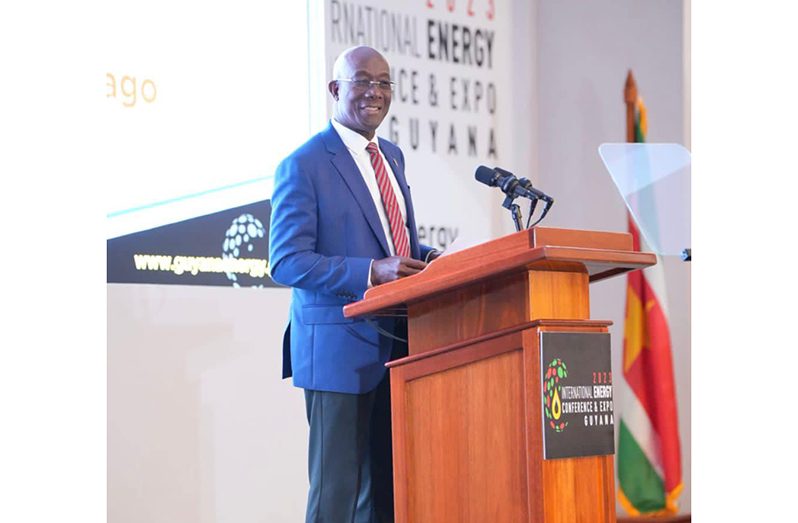WITH Guyana’s policymakers investing heavily in sustainable practices and renewable energy, several Caribbean and Latin American leaders believe that this small nation has the potential to lead the region’s low-carbon efforts.
On Tuesday, when the country’s Energy Conference and Expo 2023 opened at the Marriot Hotel in Georgetown, Colombia’s former President, Ivan Duque, posited that Guyana’s rich and diverse resources have the potential to generate income that can help advance the region’s social and economic transformation.
Duque, who opened the formal ceremony as the first speaker, explained that while oil resources should be exploited for development, focus should also be placed on accelerating the transition to non-conventional and renewable energy.
As such he believes that Guyana can develop an energy transition model that the rest of the world can follow.
“Guyana is a very important model to share with the world. In 2009, Guyana launched the Low Carbon Development Strategy and it was not just great paperwork, great vision, it is set coherent policies that is taking place day by day,” Duque said.
Guyana’s LCDS has since been updated with new policies to transform the energy matrix over the next decade, using oil, natural gas, and a mixture of renewables.
“I want to highlight that Guyana has today the possibility of using the richness of the underground to close the social divide, to eradicate poverty… Guyana has the condition of being a carbon neutral or even a carbon negative country. It has one of the lowest deforestation levels in the world,” Duque said.

He noted that there is also room for further diversity with the country being a major player in the region’s food security efforts.
“And there has to be a plan for any economic transition that allows this country to become a very important player in food security”, he said.
He added that these efforts can be fruitful with greater integration of energy, security, science and technology, along with the support of the private sector in the different industries.
Meanwhile, Suriname’s President, Chandrikapersad Santokhi, who attended the conference virtually, emphasised that the need for energy continues to increase and while nations have to meet these demands, long term solutions are needed to balance the production of oil and safeguard the environment.
“While our world is facing a climate crisis and is at the crossroads to choose sustainability over immediate needs for energy demand, there’s a present current need. Therefore, we need to take adaption and mitigation measures to lessen the impact of the climate crisis and make the transition to renewable,” he said.
Further, with both Guyana and Suriname being new oil producers, Santokhi said Suriname remains open to exploring the opportunities with Guyana.
The neighbouring countries recently established a joint programme to share expertise and resources.
“Suriname and Guyana should explore these opportunities together by developing a joint programme. Suriname and Guyana with shared expertise and resources can save costs, reduce risk, improve oil basins and develop the border areas in Suriname and Guyana to develop shore bases and airports, increase production and also promote greater transparency and accountability,” he added.

IMPORTANT ROLE
Santokhi’s statements were later endorsed by Prime Minister of St Vincent and the Grenadines, Dr. Ralph Gonsalves, who noted that Guyana has uniquely changed its economic landscape, building a modern, competitive post-colonial economy that serves citizens and by extension the region.
“With this newfound oil wealth, Guyana has embarked from my observation on the building of a modern competitive many-sided post-colonial economy which is at once local, national, regional and global,” the veteran leader said.
He reminded his audience that nations will need to work with each other to ensure that oil becomes a blessing and not a curse.
For this reason, he said individualistic societies are not sustainable.
“I’ve seen from this government in Guyana the concept of integration which I believe is one which holds great promise for our region, and for Guyana to play an important role in the leadership of that integration movement.”

Further speaking on collaborations, Prime Minister of Trinidad and Tobago, Dr. Keith Rowley, noted that oil and gas resources remain the main energy source for the world’s economic engine, and it is for this reason he believes that the Latin and Caribbean region should exploit their resources to advance economic growth and development.
Notwithstanding that the use of oil and gas resources is linked to the worsening of the climate crisis, Dr Rowley noted that clean energy is achievable but the climate change crisis should not cause developing nations to limit their use of fossil fuel.
“Fossil fuels are still the main energy source for the world’s economic engine and it is cost effective. It is resilient and affordable energy that creates economic growth. Therefore, the concept of climate change should not prevent developing countries from using fossil fuels as sources of energy in pursuit of economic growth.”
He further noted that continued investments and collaborative initiatives and strategies are vital for the region to not only increase its productivity in the oil and gas sector, but also establish renewable and clean practices to limit the worsening of the climate crisis.
“We will continue to make the case to the major global polluters to encourage investment in green initiatives identified within the region,” he said before pointedly noting that, “The regional energy landscape does not equip any single country to meet the energy security requirements of the region, especially at this time.”
He added that a cooperative approach allows for shared risks and diversified perspectives and will facilitate the development and execution of innovative solutions to the challenges associated with the energy demand of the region.
This year’s conference is being held under the theme, ‘Harnessing Energy for Development’ and will see a number of dialogue and presentations between industry experts from the Caribbean region and other parts of the world. The conference will continue until Friday.


.jpg)











